Our Facilities
At Loyola, we put our commitment to sustainability into action in how we design, maintain, and operate our campus facilities. Students at the School for Environmental Sustainability study, research, work, and even eat in a unique, immersive, sustainable learning environment. Learn more about our facilities below or explore our campus through this photo collection and Loyola’s virtual interactive campus tours.
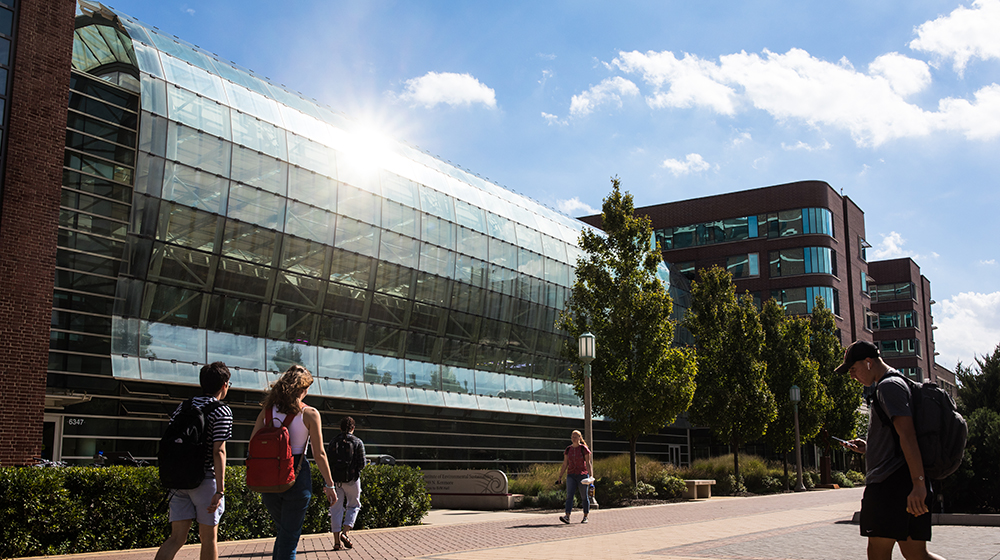
The SES building is designed to conserve energy and water and reduce our environmental footprint.
Our Green Building
Our building on the Lake Shore Campus has state-of-the-art features that minimize energy use, reduce waste, and conserve water. Below are some of the building’s sustainable features.
- Building Envelope: The soaring glass ceiling that wraps the SES building ventilates the building, collects rainwater, and provides natural light for plants in the Greenhouse Lab. Rising hot air escapes through the top of the greenhouse, while computer-controlled vents allow cooler air to enter the space from below, providing ventilation without mechanical assistance. The roof captures rainwater and diverts it into a 3,000-gallon cistern within the facility. This water is then reused for irrigation and to flush toilets in the building.
- Geothermal System: A 91-well geothermal system heats and cools the SES building by tapping into the earth’s constant temperature deep underground. The system is highly efficient, cutting the building’s heating and cooling costs by 30 percent. View this video tour to learn more.
- Engrained Café: The Engrained Café in the SES building offers sustainably grown, fair-trade coffee and seasonal, organic, and locally grown food.
- San Francisco Residence Hall: We share common spaces with San Francisco Hall, a 130,000-square-foot LEED-certified residence hall housing first- and second-year students.
Learn more about Loyola’s campus-wide sustainability efforts here.
Campus Facilities
Educational and research facilities include a working biodiesel lab, a greenhouse, vegetable gardens, labs equipped to study ecotoxicology, aquatic ecology, analytical chemistry, and more.
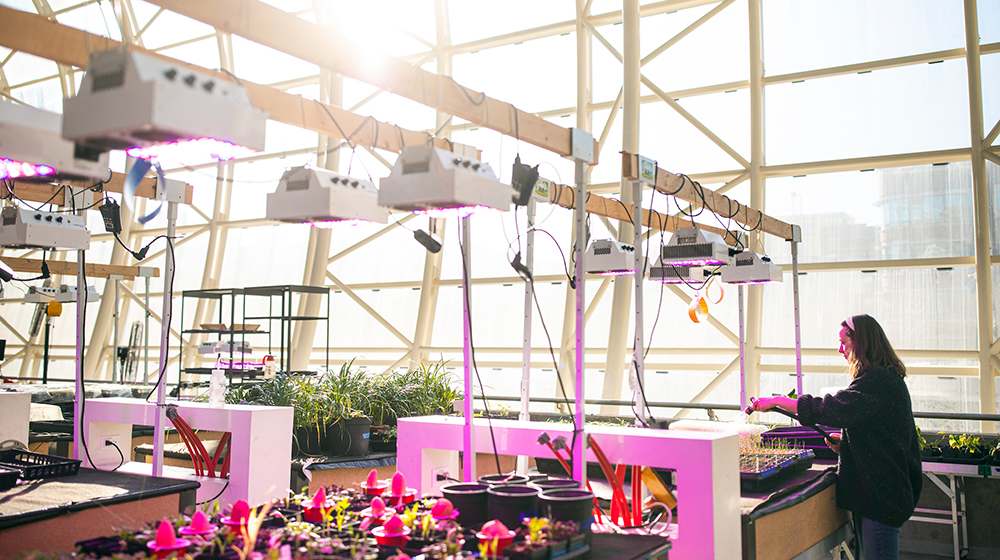
Sustainable food systems and urban agriculture facilities include a 3,100-square-foot greenhouse.
Sustainable Food Systems Facilities
The SES building features a 3,100-square-foot Greenhouse Lab used for educational activities, sustainable food systems research projects, and urban agriculture production. The greenhouse contains hydroponics systems for growing vegetables without soil and a mycology lab where students cultivate edible mushrooms. Aquaponics systems in the Greenhouse Lab and the SES lobby combine fish and sustainable plant production. Students also gain experience with sustainable, small-scale urban agriculture in Winthrop Garden, located on the Lake Shore Campus. Click here to view a video tour of the urban agriculture facilities.
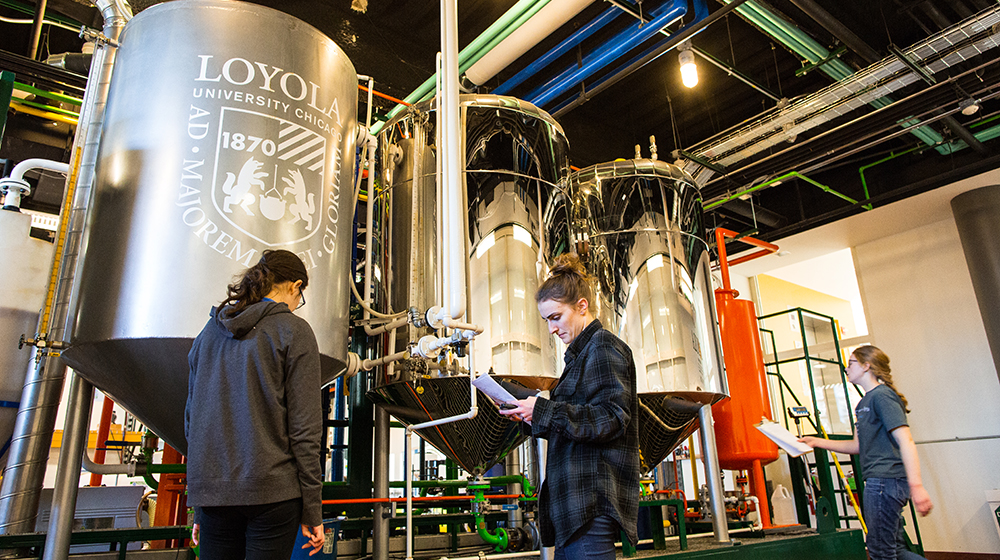
Students convert used cooking oil into biodiesel fuel in the Searle Biodiesel Lab.
Searle Biodiesel Lab
The Searle Biodiesel Lab in the SES building is home to Loyola’s award-winning Biodiesel Program. Students operate a self-sustaining business converting used cooking oil into biodiesel fuel for our shuttle bus systems. The byproducts of that process are turned into hand soap for our campus restrooms. The lab houses our fifth-generation biodiesel processor, methanol recovery system, and soap production equipment. It also contains laboratory space for research and quality testing. View a video tour here. Learn more about the Biodiesel Program here.
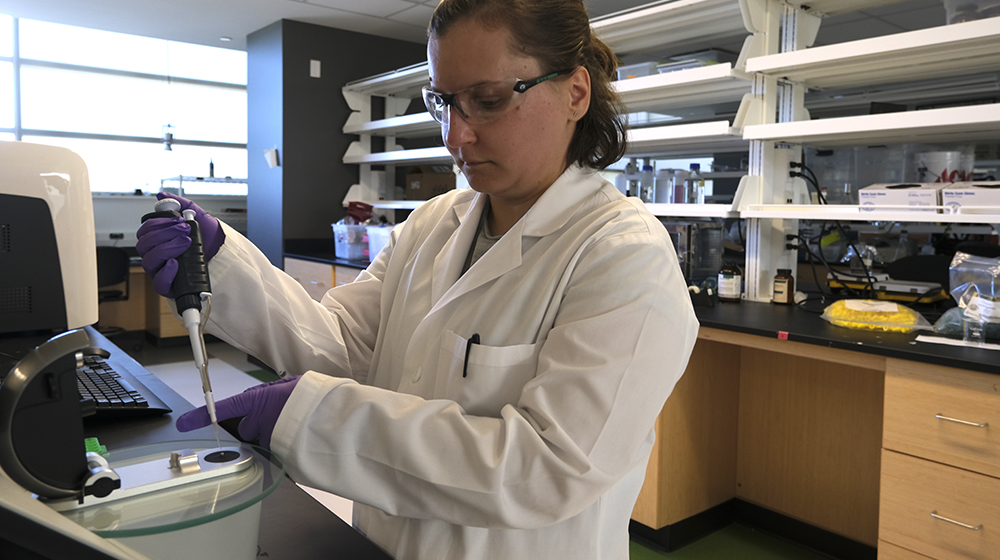
Faculty, staff, and students use the SES labs for research and education.
Analytical Facilities and Research Equipment
SES has two research labs containing a variety of analytical equipment. Faculty, staff, and students use the equipment to test samples – such as water, soil, biochar, plants, etc. – for nutrients, metals, pesticides, per-and polyfluoroalkyl substances (PFAS), and many other analytes. Below is a list of selected SES instrumentation:
- Ion Chromatograph (IC): anions and cations
- Liquid Chromatograph-Mass Spectrometer (HPLC-MS): triple quadrupole
- UV-Vis Spectrophotometer
- Fluorescence Spectrophotometer
- C/N Analyzer
- Polymerase Chain Reaction (PCR)
- Gel Electrophoresis with Imaging
- Gas Chromatograph (GC)
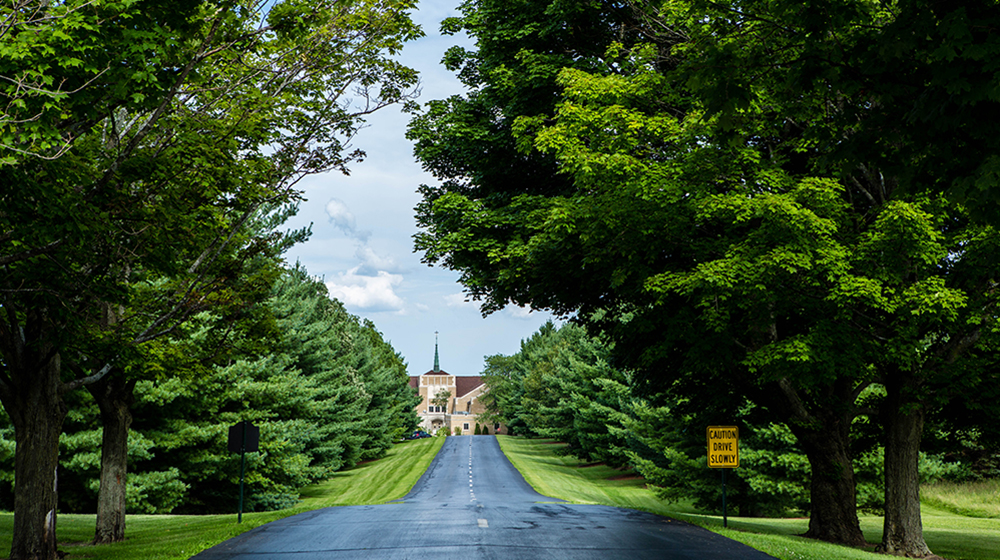
The Loyola University Retreat and Ecology campus features nearly 100-acres of green space.
Loyola University Retreat and Ecology Campus
The Loyola University Retreat and Ecology Campus (LUREC) is 50 miles northwest of the University’s Lake Shore Campus in McHenry County, Illinois. The campus includes hotel-style and dormitory accommodations, a dining hall, classrooms, lab facilities, and nearly 100 acres of green space—making it an ideal location to study ecology and environmental sustainability. SES offers three-week immersive courses at LUREC each summer. Students also visit the campus to participate in field trips and restoration work days.
Scheduling a Tour or Campus Visit
In-person group tours of SES are available to internal (Loyola-affiliated) and external groups, and requests are welcome from high schools, colleges, and community organizations. Visit the Facilities Tours page to learn more and request a tour.
Prospective students can find information about scheduling a campus visit here.
At Loyola, we put our commitment to sustainability into action in how we design, maintain, and operate our campus facilities. Students at the School for Environmental Sustainability study, research, work, and even eat in a unique, immersive, sustainable learning environment. Learn more about our facilities below or explore our campus through this photo collection and Loyola’s virtual interactive campus tours.
Our Green Building
Our building on the Lake Shore Campus has state-of-the-art features that minimize energy use, reduce waste, and conserve water. Below are some of the building’s sustainable features.
- Building Envelope: The soaring glass ceiling that wraps the SES building ventilates the building, collects rainwater, and provides natural light for plants in the Greenhouse Lab. Rising hot air escapes through the top of the greenhouse, while computer-controlled vents allow cooler air to enter the space from below, providing ventilation without mechanical assistance. The roof captures rainwater and diverts it into a 3,000-gallon cistern within the facility. This water is then reused for irrigation and to flush toilets in the building.
- Geothermal System: A 91-well geothermal system heats and cools the SES building by tapping into the earth’s constant temperature deep underground. The system is highly efficient, cutting the building’s heating and cooling costs by 30 percent. View this video tour to learn more.
- Engrained Café: The Engrained Café in the SES building offers sustainably grown, fair-trade coffee and seasonal, organic, and locally grown food.
- San Francisco Residence Hall: We share common spaces with San Francisco Hall, a 130,000-square-foot LEED-certified residence hall housing first- and second-year students.
Learn more about Loyola’s campus-wide sustainability efforts here.
Campus Facilities
Educational and research facilities include a working biodiesel lab, a greenhouse, vegetable gardens, labs equipped to study ecotoxicology, aquatic ecology, analytical chemistry, and more.
Sustainable Food Systems Facilities
The SES building features a 3,100-square-foot Greenhouse Lab used for educational activities, sustainable food systems research projects, and urban agriculture production. The greenhouse contains hydroponics systems for growing vegetables without soil and a mycology lab where students cultivate edible mushrooms. Aquaponics systems in the Greenhouse Lab and the SES lobby combine fish and sustainable plant production. Students also gain experience with sustainable, small-scale urban agriculture in Winthrop Garden, located on the Lake Shore Campus. Click here to view a video tour of the urban agriculture facilities.
Searle Biodiesel Lab
The Searle Biodiesel Lab in the SES building is home to Loyola’s award-winning Biodiesel Program. Students operate a self-sustaining business converting used cooking oil into biodiesel fuel for our shuttle bus systems. The byproducts of that process are turned into hand soap for our campus restrooms. The lab houses our fifth-generation biodiesel processor, methanol recovery system, and soap production equipment. It also contains laboratory space for research and quality testing. View a video tour here. Learn more about the Biodiesel Program here.
Analytical Facilities and Research Equipment
SES has two research labs containing a variety of analytical equipment. Faculty, staff, and students use the equipment to test samples – such as water, soil, biochar, plants, etc. – for nutrients, metals, pesticides, per-and polyfluoroalkyl substances (PFAS), and many other analytes. Below is a list of selected SES instrumentation:
- Ion Chromatograph (IC): anions and cations
- Liquid Chromatograph-Mass Spectrometer (HPLC-MS): triple quadrupole
- UV-Vis Spectrophotometer
- Fluorescence Spectrophotometer
- C/N Analyzer
- Polymerase Chain Reaction (PCR)
- Gel Electrophoresis with Imaging
- Gas Chromatograph (GC)
Loyola University Retreat and Ecology Campus
The Loyola University Retreat and Ecology Campus (LUREC) is 50 miles northwest of the University’s Lake Shore Campus in McHenry County, Illinois. The campus includes hotel-style and dormitory accommodations, a dining hall, classrooms, lab facilities, and nearly 100 acres of green space—making it an ideal location to study ecology and environmental sustainability. SES offers three-week immersive courses at LUREC each summer. Students also visit the campus to participate in field trips and restoration work days.
Scheduling a Tour or Campus Visit
In-person group tours of SES are available to internal (Loyola-affiliated) and external groups, and requests are welcome from high schools, colleges, and community organizations. Visit the Facilities Tours page to learn more and request a tour.
Prospective students can find information about scheduling a campus visit here.
